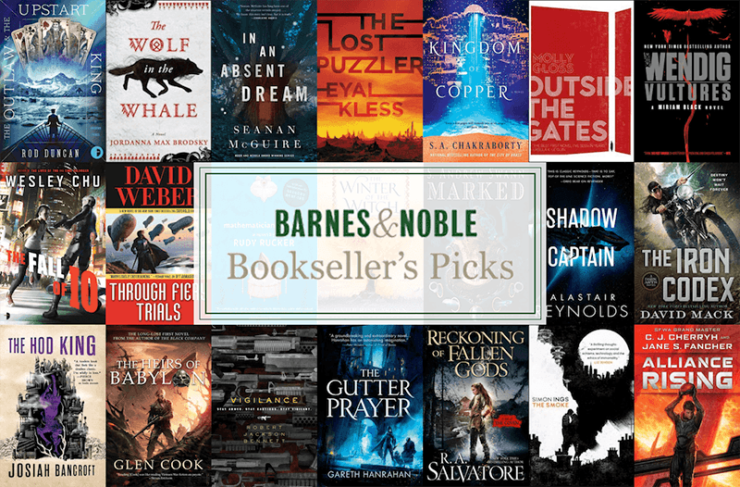For two decades, Jim Killen has served as the science fiction and fantasy book buyer for Barnes & Noble. Every month on Tor.com and the B&N Sci-Fi & Fantasy Blog, Jim shares his curated list of the month’s best science fiction & fantasy books.
Outside the Gates, by Molly Gloss (January 1, Saga Press—Paperback)
 Originally published in 1986, Molly Gloss’ slender first novel tells the tale of Vren, a boy who is exiled from his home because of his ability to communicate with animals. Vren has been told that beyond the safety of the walls are monsters, and standing at the gates where so many others have died when forced out of their home, Vren is certain his fate is just as grim. Then he meets Rusche, a weather-worker gifted with his own powers, and he’s adopted by a family of wolves. For a while, Vren is happy and content—but a rogue spellbinder who uses those with psychic abilities for his own evil ends kidnaps Rusche, and it’s up to Vren and his wold family to save him before it’s too late. At the time of publication, Ursula K. Le Guin—who later became a close friend of the author—called it one of the best first novels she’d seen in years. This reissue is long overdue—and it’s just the first of four of Gloss’ works Saga Press is reissuing this year with new covers by Jeffrey Alan Love.
Originally published in 1986, Molly Gloss’ slender first novel tells the tale of Vren, a boy who is exiled from his home because of his ability to communicate with animals. Vren has been told that beyond the safety of the walls are monsters, and standing at the gates where so many others have died when forced out of their home, Vren is certain his fate is just as grim. Then he meets Rusche, a weather-worker gifted with his own powers, and he’s adopted by a family of wolves. For a while, Vren is happy and content—but a rogue spellbinder who uses those with psychic abilities for his own evil ends kidnaps Rusche, and it’s up to Vren and his wold family to save him before it’s too late. At the time of publication, Ursula K. Le Guin—who later became a close friend of the author—called it one of the best first novels she’d seen in years. This reissue is long overdue—and it’s just the first of four of Gloss’ works Saga Press is reissuing this year with new covers by Jeffrey Alan Love.
Mathematicians in Love, by Rudy Rucker (January 2, Night Shade Books—Paperback)
 This whimsical novel by cult favorite Rudy Rucker was originally published by Tor in 2006, and is getting a new lease on life via Night Shade Books. Rucker spins a story of an alternate Berkeley, California where Ph.D. candidates Paula and Bela study under the mad genius Roland Haut, inventing a paracomputer called the Gobubble that allows them to predict future events. As Bela and Paul compete for the affections of Bela’s girlfriend, Alma Ziff, the mathematicians engage in increasingly delirious stunts to catch her eye. This is a universe ruled by a jellyfish-cum-god, and a group of characters whose casual conversation is peppered with Rucker’s delightful made-up math-speak. It’s one of the most unique and surprisingly entertaining weird SF novels ever penned.
This whimsical novel by cult favorite Rudy Rucker was originally published by Tor in 2006, and is getting a new lease on life via Night Shade Books. Rucker spins a story of an alternate Berkeley, California where Ph.D. candidates Paula and Bela study under the mad genius Roland Haut, inventing a paracomputer called the Gobubble that allows them to predict future events. As Bela and Paul compete for the affections of Bela’s girlfriend, Alma Ziff, the mathematicians engage in increasingly delirious stunts to catch her eye. This is a universe ruled by a jellyfish-cum-god, and a group of characters whose casual conversation is peppered with Rucker’s delightful made-up math-speak. It’s one of the most unique and surprisingly entertaining weird SF novels ever penned.
The Fall of Io, by Wesley Chu (January 8, Angry Robot—Paperback)
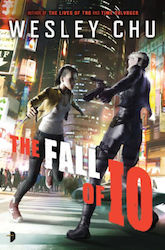 Chu’s long-awaited sequel to The Rise of Io returns to the story of über-competent Ella and Io, the utterly incompetent alien intelligence that has taken up residence inside of her head. They’ve recently been expelled from the scheme by the alien sect Prophus to train Ella as an agent in their efforts to raise humanity to a technological level that will be useful to their war effort against the Genjix—the Prophus’ ruthless alien siblings who are willing to destroy humanity in pursuit of their goal of returning to their own home world. Ella is happily back to a life of short cons and petty heists, with Io unhappily along for the ride—but it turns out Io has information the Genjix need to further their own ends, and Ella and Io find themselves on the run, hunted by immaterial beings who have been guiding human history and development for centuries. This is the series that made Chu’s name in sci-fi (and helped win him a Cambell Award). We’re happy to return to it.
Chu’s long-awaited sequel to The Rise of Io returns to the story of über-competent Ella and Io, the utterly incompetent alien intelligence that has taken up residence inside of her head. They’ve recently been expelled from the scheme by the alien sect Prophus to train Ella as an agent in their efforts to raise humanity to a technological level that will be useful to their war effort against the Genjix—the Prophus’ ruthless alien siblings who are willing to destroy humanity in pursuit of their goal of returning to their own home world. Ella is happily back to a life of short cons and petty heists, with Io unhappily along for the ride—but it turns out Io has information the Genjix need to further their own ends, and Ella and Io find themselves on the run, hunted by immaterial beings who have been guiding human history and development for centuries. This is the series that made Chu’s name in sci-fi (and helped win him a Cambell Award). We’re happy to return to it.
In an Absent Dream, by Seanan McGuire (January 8, Tor Books—Hardcover)
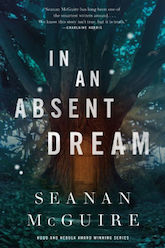 McGuire’s fourth Wayward Children novella is a prequel, telling the story of Katherine Lundy, the erstwhile group therapy leader at Eleanor West’s Home for Wayward Children (“erstwhile” in that she was killed off midway through the first book, Every Heart a Doorway). As a child, Katherine is absorbed in her studies and wants nothing to do with the responsibilities—or suffocation—of being a housewife, though that’s what everyone seems to assume she will do when she grows up. When Katherine discovers a portal that leads her to the Goblin Market, a place ruled by logic and reason expressed in riddles and falsehoods, she thinks she has finally found her place in the world. In the Goblin Market you can make any bargain you like—but there is always a cost. When Katherine realizes her time at the Market is drawing to a close she’s desperate enough to make such a bargain—with unexpected and heartbreaking results. In a series built from the bones of childhood, this installment may be the most painfully true yet.
McGuire’s fourth Wayward Children novella is a prequel, telling the story of Katherine Lundy, the erstwhile group therapy leader at Eleanor West’s Home for Wayward Children (“erstwhile” in that she was killed off midway through the first book, Every Heart a Doorway). As a child, Katherine is absorbed in her studies and wants nothing to do with the responsibilities—or suffocation—of being a housewife, though that’s what everyone seems to assume she will do when she grows up. When Katherine discovers a portal that leads her to the Goblin Market, a place ruled by logic and reason expressed in riddles and falsehoods, she thinks she has finally found her place in the world. In the Goblin Market you can make any bargain you like—but there is always a cost. When Katherine realizes her time at the Market is drawing to a close she’s desperate enough to make such a bargain—with unexpected and heartbreaking results. In a series built from the bones of childhood, this installment may be the most painfully true yet.
Through Fiery Trials, by David Weber (January 8, Tor Books—Hardcover)
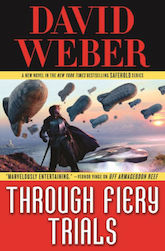 Weber’s 10th Safehold novel begins with peace. After so much time avoiding technology in order to ensure the survival of humanity, the war between technology-endorsing Charis and the luddite-like Church of God’s Awaiting is finally over. The Charis’ desire to see humanity move forward through science and technology—inspired long ago by Merlin, an artificial being hosting the intelligence of a former naval officer and obeying ancient orders to free mankind from the yoke of the megalomaniacal Archangels—have won the day. But Safehold is now a broken world as a result, and Charis’ victory has shifted the balance of power and the nature of alliances in ways not immediately apparent. Rebellions arise in the war’s wake, and the Charisian cabal worries the Archangels may be returning sooner rather than later, driving them to push a radical agenda of industrialization that further destabilizes the unstable.
Weber’s 10th Safehold novel begins with peace. After so much time avoiding technology in order to ensure the survival of humanity, the war between technology-endorsing Charis and the luddite-like Church of God’s Awaiting is finally over. The Charis’ desire to see humanity move forward through science and technology—inspired long ago by Merlin, an artificial being hosting the intelligence of a former naval officer and obeying ancient orders to free mankind from the yoke of the megalomaniacal Archangels—have won the day. But Safehold is now a broken world as a result, and Charis’ victory has shifted the balance of power and the nature of alliances in ways not immediately apparent. Rebellions arise in the war’s wake, and the Charisian cabal worries the Archangels may be returning sooner rather than later, driving them to push a radical agenda of industrialization that further destabilizes the unstable.
The Lost Puzzler, by Eyal Kless (January 8, Harper Voyager—Paperback)
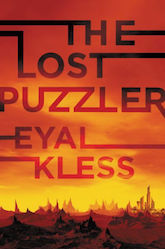 The debut novel of internationally acclaimed classical violinist Eyal Kless proves him skilled at more than one form of artistic expression. This complex science fantasy takes place in a deeply-imagined, puzzle-laden post-apocalyptic world 100 years after a disaster known as the Catastrophe. Humanity has slowly recovered along different lines—the Wildeners have reverted to primitive beliefs, while others work to restore the old technological glory. In the center of the fallen Tarkanian empire, the City of Towers hosts the Guild of Historians. Salvationists seek out the lost Tarkanioan technology, each search party led by a Puzzler skilled in opening the digital locks protecting forgotten treasures. Rafik, a skilled Puzzler who has been marked as cursed, goes missing while leading a dangerous expedition in a booby-trapped city. A decade later, a lowly scribe for the Guild is tasked with searching for him. It seems Rafik is the key to a revived Tarakan Empire and the future of humanity—but a host of monsters, traps, and puzzles stand in the way.
The debut novel of internationally acclaimed classical violinist Eyal Kless proves him skilled at more than one form of artistic expression. This complex science fantasy takes place in a deeply-imagined, puzzle-laden post-apocalyptic world 100 years after a disaster known as the Catastrophe. Humanity has slowly recovered along different lines—the Wildeners have reverted to primitive beliefs, while others work to restore the old technological glory. In the center of the fallen Tarkanian empire, the City of Towers hosts the Guild of Historians. Salvationists seek out the lost Tarkanioan technology, each search party led by a Puzzler skilled in opening the digital locks protecting forgotten treasures. Rafik, a skilled Puzzler who has been marked as cursed, goes missing while leading a dangerous expedition in a booby-trapped city. A decade later, a lowly scribe for the Guild is tasked with searching for him. It seems Rafik is the key to a revived Tarakan Empire and the future of humanity—but a host of monsters, traps, and puzzles stand in the way.
Alliance Rising, by C.J. Cherryh and Jane S. Fancher (January 8, DAW—Hardcover)
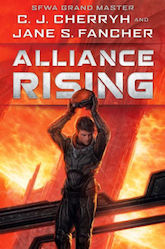 The latest entry in the sprawling, complex, and Hugo-winning Company Wars series begins with a mysterious, unidentified ship on its way to Alpha station. Like the other stations of the Hinder Stars near Sol, Alpha Station has fallen far behind newer megastations like Pell and Cyteen. Rumors fly about the ship’s purpose and origin, with much of the suspicion centering on another ship docked at Alpha, the mysterious The Rights of Man, commanded by the Earth Company. The true purpose of The Rights of Man is unknown, and many believe the mystery ship was sent by Pell to investigate it. James Robert Neihart, Captain of the Pell ship Finity’s End, also intends to find out, suspecting that there’s more going on with the ship—and with Alpha Station—than meets the eye.
The latest entry in the sprawling, complex, and Hugo-winning Company Wars series begins with a mysterious, unidentified ship on its way to Alpha station. Like the other stations of the Hinder Stars near Sol, Alpha Station has fallen far behind newer megastations like Pell and Cyteen. Rumors fly about the ship’s purpose and origin, with much of the suspicion centering on another ship docked at Alpha, the mysterious The Rights of Man, commanded by the Earth Company. The true purpose of The Rights of Man is unknown, and many believe the mystery ship was sent by Pell to investigate it. James Robert Neihart, Captain of the Pell ship Finity’s End, also intends to find out, suspecting that there’s more going on with the ship—and with Alpha Station—than meets the eye.
The Winter of the Witch, by Katherine Arden (January 8, Del Rey—Hardcover)
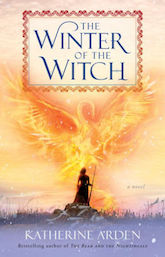 The concluding volume of Arden’s acclaimed Winternight trilogy picks up right where The Girl in the Tower left off, with Moscow in ashes from Vasya’s inexpert use of a Firebird. Russia and the people Vasya love are still in danger, however, as Arden continues her secret history of a nation’s turmoils in parallel with the story of Vasya’s becoming. She stumbles forward in her troubled relationship with the winter-king Morozko, while the Grand Prince Dmitrii makes decisions leading them all inevitably towards a battle that could unite Russia—though the chaos demon Medved would prefer events unfold otherwise. Vasya is no longer the frightened girl of the earlier books, but neither has she perfected her abilities. Even still, she must embark on several dangerous magical quests in order to protect the people and the land she loves. Along the way, she meets new and fascinating chyerti, and all the threads of the two previous books weave together in an epic, truly satisfying ending.
The concluding volume of Arden’s acclaimed Winternight trilogy picks up right where The Girl in the Tower left off, with Moscow in ashes from Vasya’s inexpert use of a Firebird. Russia and the people Vasya love are still in danger, however, as Arden continues her secret history of a nation’s turmoils in parallel with the story of Vasya’s becoming. She stumbles forward in her troubled relationship with the winter-king Morozko, while the Grand Prince Dmitrii makes decisions leading them all inevitably towards a battle that could unite Russia—though the chaos demon Medved would prefer events unfold otherwise. Vasya is no longer the frightened girl of the earlier books, but neither has she perfected her abilities. Even still, she must embark on several dangerous magical quests in order to protect the people and the land she loves. Along the way, she meets new and fascinating chyerti, and all the threads of the two previous books weave together in an epic, truly satisfying ending.
The Outlaw and the Upstart King, by Rod Duncan (January 8, Angry Robot—Paperback)
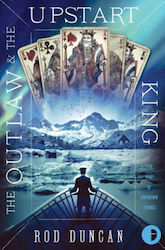 The sequel to the Philip K. Dick Award-nominated Queen of All Crows is set on the Island of the Free, a version of Newfoundland where violent clans rule, laws and oaths are dictated by tattoos inked on the skin, and the only thing the squabbling factions agree on is that no king will ever rule them. Elias No-Thumbs returns to his homeland, smuggling something that could upset the balance of power in the name of the revenge he seeks. His plan pivots on the assistance of a mysterious woman and her friends who have crash-landed on the Island of the Free and desperately wish to leave—but the only ways ion or off the island are controlled by warlords known as Patron Protectors. Faithful Duncan fans will recognize the mystery woman as Elizabeth Barnabus, protagonist of the Fall of the Gas-Lit Empire trilogy, but readers both old and new will enjoy seeing her save herself and help Elias get his revenge on the people who took his wealth (and his thumbs).
The sequel to the Philip K. Dick Award-nominated Queen of All Crows is set on the Island of the Free, a version of Newfoundland where violent clans rule, laws and oaths are dictated by tattoos inked on the skin, and the only thing the squabbling factions agree on is that no king will ever rule them. Elias No-Thumbs returns to his homeland, smuggling something that could upset the balance of power in the name of the revenge he seeks. His plan pivots on the assistance of a mysterious woman and her friends who have crash-landed on the Island of the Free and desperately wish to leave—but the only ways ion or off the island are controlled by warlords known as Patron Protectors. Faithful Duncan fans will recognize the mystery woman as Elizabeth Barnabus, protagonist of the Fall of the Gas-Lit Empire trilogy, but readers both old and new will enjoy seeing her save herself and help Elias get his revenge on the people who took his wealth (and his thumbs).
The Heirs of Babylon, by Glen Cook (January 15, Night Shade Books—Paperback)
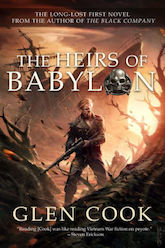 Cook’s second novel, originally published in 1972 and long out of print, gets a loving reissue from Night Shade Books. It’s set in 2139, by which point mankind has almost been decimated by continuous nuclear and chemical warfare. Humanity survives in isolated islands of civilization, with order maintained by the brutal Political Office that dictates how everyone should think and act—and which calls the Gathering, when the able-bodied must come together to fight a mysterious enemy. When the Gathering is called, Kurt Ranke must abandon his pregnant wife and board the ancient, decrepit destroyer Jäger, a once-mighty warship that has suffered two centuries of decay. Along with other reluctant warriors, Kurt must face the Final Meeting, a legendary battle from which no one has ever returned. This isn’t quite the Glen Cook of the Black Company novels, but this early work is much more than a mere curiosity.
Cook’s second novel, originally published in 1972 and long out of print, gets a loving reissue from Night Shade Books. It’s set in 2139, by which point mankind has almost been decimated by continuous nuclear and chemical warfare. Humanity survives in isolated islands of civilization, with order maintained by the brutal Political Office that dictates how everyone should think and act—and which calls the Gathering, when the able-bodied must come together to fight a mysterious enemy. When the Gathering is called, Kurt Ranke must abandon his pregnant wife and board the ancient, decrepit destroyer Jäger, a once-mighty warship that has suffered two centuries of decay. Along with other reluctant warriors, Kurt must face the Final Meeting, a legendary battle from which no one has ever returned. This isn’t quite the Glen Cook of the Black Company novels, but this early work is much more than a mere curiosity.
Shadow Captain, by Alastair Reynolds (January 15, Orbit—Paperback)
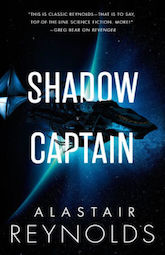 Reynolds’ Revenger—aka Treasure Island in space!—was hailed as his most accessible novel ever: a rollicking tale of pirate adventure set in a universe where humanity rose to dominate the stars—and then declined. The sequel finds sisters Adrana and Fura, former adventure-seeking stowaways on a salvage ship, much changed. After signing on to Captain Rackamore’s crew as they sought out the ancient caches of technology left behind by long-dead civilizations, Adrana was scarred by her enslavement by pirate Bosa Sennen, and Fura became obsessed with the hidden treasure Sennen is rumored to have amassed. Now, Sennen can’t tell them where it is, because she’s dead— but the sister have her ship. Unfortunately, that also means they’ve been marked for death by the forces that still crave revenge on the bloodthirsty pirate.
Reynolds’ Revenger—aka Treasure Island in space!—was hailed as his most accessible novel ever: a rollicking tale of pirate adventure set in a universe where humanity rose to dominate the stars—and then declined. The sequel finds sisters Adrana and Fura, former adventure-seeking stowaways on a salvage ship, much changed. After signing on to Captain Rackamore’s crew as they sought out the ancient caches of technology left behind by long-dead civilizations, Adrana was scarred by her enslavement by pirate Bosa Sennen, and Fura became obsessed with the hidden treasure Sennen is rumored to have amassed. Now, Sennen can’t tell them where it is, because she’s dead— but the sister have her ship. Unfortunately, that also means they’ve been marked for death by the forces that still crave revenge on the bloodthirsty pirate.
The Iron Codex, by David Mack (January 15, Tor Books—Paperback)
 In Midnight Front, Cade Martin was a World War II hero mastering sorcery in the allied struggle against fascism. Years later, he is worrying his MI6 handlers, his frequent unexplained absences sending up red flags. Meanwhile, Anja Kernova hunts escaped Nazis in South America using the Iron Codex, a magical book of immense power. Other forces want the power that the Codex represents, however, and Anja soon finds herself on the run, even as a secretive cabal schemes to transform the USA into a fascist state using magical forces. Everyone’s path begins to converge on Bikini Atoll, where the Castle Bravo nuclear tests are scheduled to begin. If you like your history twisted up with fantastic magical invention, this is the series for you.
In Midnight Front, Cade Martin was a World War II hero mastering sorcery in the allied struggle against fascism. Years later, he is worrying his MI6 handlers, his frequent unexplained absences sending up red flags. Meanwhile, Anja Kernova hunts escaped Nazis in South America using the Iron Codex, a magical book of immense power. Other forces want the power that the Codex represents, however, and Anja soon finds herself on the run, even as a secretive cabal schemes to transform the USA into a fascist state using magical forces. Everyone’s path begins to converge on Bikini Atoll, where the Castle Bravo nuclear tests are scheduled to begin. If you like your history twisted up with fantastic magical invention, this is the series for you.
Marked, by S. Andrew Swann (January 15, DAW—Paperback)
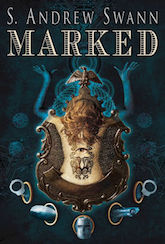 Detective Dana Rohan is a cop with a near-perfect arrest rate—and a secret. She doesn’t remember how she got the elaborate mark on her back during her traumatic childhood, but it allows her to travel through time and alternative dimensions, giving her the ability to see the crimes she’s investigating as they are being committed. Power like that rarely comes without a cost, and one night Dana is approached by a homeless man who warns her that the Shadows are coming—and is then violently murdered by an armored monster. Dana plunges into a bizarre adventure across strange alternate worlds, pursued by the shambling, zombie-like Shadows and beset upon by violent relatives she’s never heard of before. If she can just stay alive, she might have a chance to finally understand her strange abilities—and figure out why everyone wants to kill her.
Detective Dana Rohan is a cop with a near-perfect arrest rate—and a secret. She doesn’t remember how she got the elaborate mark on her back during her traumatic childhood, but it allows her to travel through time and alternative dimensions, giving her the ability to see the crimes she’s investigating as they are being committed. Power like that rarely comes without a cost, and one night Dana is approached by a homeless man who warns her that the Shadows are coming—and is then violently murdered by an armored monster. Dana plunges into a bizarre adventure across strange alternate worlds, pursued by the shambling, zombie-like Shadows and beset upon by violent relatives she’s never heard of before. If she can just stay alive, she might have a chance to finally understand her strange abilities—and figure out why everyone wants to kill her.
The Kingdom of Copper, by S.A. Chakraborty (January 22, Harper Voyager—Hardcover)
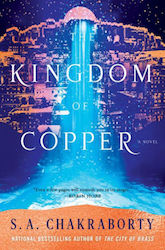 Con artist Nahri accidentally summoned the djinn Dara in 18th century Cairo in The City of Brass and found herself whisked off to the royal court of Daevabad, where she had to use every bit of her wits and her magical abilities just to survive. As the sequel begins, Prince Ali has been banished and is fleeing assassins, even as Daevabad recovers from a devastating battle. Nahri now knows more about her origins—and her power—but that doesn’t mean she’s out of danger, even if she did just marry the heir to the throne. Trapped in a luxurious prison, the king uses her family as leverage to ensure her compliance, and Nahri must once again navigate the complex alliances, grudges, and familial connections of the magical city in order to protect those she loves. Chakraborty’s debut was one of our best-loved books of 2016, and the sequel proves worth the wait.
Con artist Nahri accidentally summoned the djinn Dara in 18th century Cairo in The City of Brass and found herself whisked off to the royal court of Daevabad, where she had to use every bit of her wits and her magical abilities just to survive. As the sequel begins, Prince Ali has been banished and is fleeing assassins, even as Daevabad recovers from a devastating battle. Nahri now knows more about her origins—and her power—but that doesn’t mean she’s out of danger, even if she did just marry the heir to the throne. Trapped in a luxurious prison, the king uses her family as leverage to ensure her compliance, and Nahri must once again navigate the complex alliances, grudges, and familial connections of the magical city in order to protect those she loves. Chakraborty’s debut was one of our best-loved books of 2016, and the sequel proves worth the wait.
The Gutter Prayer, by Gareth Hanrahan (January 22, Orbit—Paperback)
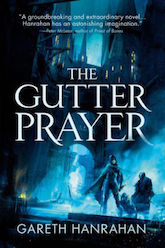 Hanrahan’s epic fantasy debut centers on the city of Guerdon, to where refugees flee from an epic ongoing war between insane gods and the sorcerers who once served them. This is where Carillon Thay, desperate thief and recent member of the Thieves’ Brotherhood, finds herself, alongside her friends Rat and Spar. Thay is dealing with the aftermath of a heist gone wrong, and must contend with Ravellers,the shape-shifting servants of the ancient Black Iron Gods which haven’t been seen in decades. As an apocalypse approaches Guerdon, the last place of safety in this violent world, these three thieves can only count on themselves—but it seems their fates may be strangely intertwined with the warring guilds and other powers that be in the city, and the network of ancient tunnels deep below its streets. Hanrahan brings his city to life in lyrical prose, even as the plot leaps from action sequence to breathless chase and back again.
Hanrahan’s epic fantasy debut centers on the city of Guerdon, to where refugees flee from an epic ongoing war between insane gods and the sorcerers who once served them. This is where Carillon Thay, desperate thief and recent member of the Thieves’ Brotherhood, finds herself, alongside her friends Rat and Spar. Thay is dealing with the aftermath of a heist gone wrong, and must contend with Ravellers,the shape-shifting servants of the ancient Black Iron Gods which haven’t been seen in decades. As an apocalypse approaches Guerdon, the last place of safety in this violent world, these three thieves can only count on themselves—but it seems their fates may be strangely intertwined with the warring guilds and other powers that be in the city, and the network of ancient tunnels deep below its streets. Hanrahan brings his city to life in lyrical prose, even as the plot leaps from action sequence to breathless chase and back again.
The Smoke, by Simon Ings (January 22, Titan Books—Paperback)
 Much of Ings’ latest novel is told in the second person, but don’t let that distract you; the author is known for crafting challenging narratives, but he always has his reasons, and the end result is a book of alternate history unlike any you’ve ever encountered. The point of diversion with our own timeline is the discovery of the biophotonic ray in the 20th century—a discovery that divides the human race into three distinct sub-species, and makes all manner of medical miracles commonplace. Protagonist Stuart returns to Yorkshire, where they’re making parts for a spaceship headed for Jupiter, after his breakup with Fel, daughter of the leader of the Bund, the group responsible for many of said medical breakthroughs. But Stuart can’t seem to stay away from Fel, or from London—now known as the Smoke, and in turmoil due to the increasingly fractured nature of humanity. Without explaining too much: this might be the year’s weirdest science fiction book, and it’s only January.
Much of Ings’ latest novel is told in the second person, but don’t let that distract you; the author is known for crafting challenging narratives, but he always has his reasons, and the end result is a book of alternate history unlike any you’ve ever encountered. The point of diversion with our own timeline is the discovery of the biophotonic ray in the 20th century—a discovery that divides the human race into three distinct sub-species, and makes all manner of medical miracles commonplace. Protagonist Stuart returns to Yorkshire, where they’re making parts for a spaceship headed for Jupiter, after his breakup with Fel, daughter of the leader of the Bund, the group responsible for many of said medical breakthroughs. But Stuart can’t seem to stay away from Fel, or from London—now known as the Smoke, and in turmoil due to the increasingly fractured nature of humanity. Without explaining too much: this might be the year’s weirdest science fiction book, and it’s only January.
The Hod King, by Josiah Bancroft (January 22, Orbit—Paperback)
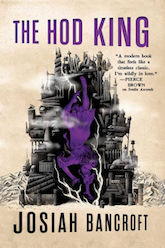 The third book in Bancroft’s deeply compelling Books of Babel quartet more than delivers on the building promise of the first two. The Sphinx, having discovered the location of Senlin’s missing wife Marya, worries over a brewing revolution, and sends her new servant Senlin to the Ringdom of Pelphia to investigate. In Pelphia, Senlin is, per usual, caught up in local intrigue: specifically, the brutal, bloody arena where the enslaved hods fight as gladiators to amuse the crowds. Meanwhile, Voleta and Iren take on false identities in an attempt to get close to Marya, who has married Duke Wilhelm Horace Pell and become a celebrity isolated by fame. Edith, now captain of the Sphinx’s flagship, investigates happenings along the hod’s Black Trail, which stretches the height of the entire Tower, and hears whisperings of a figure known as the Hod King, whose identity drives this volume to its cliffhanger conclusion—as does the question of whether Senlin can stay focused on his mission, or if he’ll risk disobeying the Sphinx in order to finally reunite with Marya. Bancroft once again perfectly pairs beautiful prose with lively characters and an exploration of an utterly original fictional edifice. A classic in the making, it will set your expectations high for the concluding volume, expected to arrive in 2020.
The third book in Bancroft’s deeply compelling Books of Babel quartet more than delivers on the building promise of the first two. The Sphinx, having discovered the location of Senlin’s missing wife Marya, worries over a brewing revolution, and sends her new servant Senlin to the Ringdom of Pelphia to investigate. In Pelphia, Senlin is, per usual, caught up in local intrigue: specifically, the brutal, bloody arena where the enslaved hods fight as gladiators to amuse the crowds. Meanwhile, Voleta and Iren take on false identities in an attempt to get close to Marya, who has married Duke Wilhelm Horace Pell and become a celebrity isolated by fame. Edith, now captain of the Sphinx’s flagship, investigates happenings along the hod’s Black Trail, which stretches the height of the entire Tower, and hears whisperings of a figure known as the Hod King, whose identity drives this volume to its cliffhanger conclusion—as does the question of whether Senlin can stay focused on his mission, or if he’ll risk disobeying the Sphinx in order to finally reunite with Marya. Bancroft once again perfectly pairs beautiful prose with lively characters and an exploration of an utterly original fictional edifice. A classic in the making, it will set your expectations high for the concluding volume, expected to arrive in 2020.
Vultures, by Chuck Wendig (January 22, Saga Press—Paperback)
 Wendig’s sixth and final book in the Miriam Black series sees the foul-mouthed deathseer’s world in flux. The Trespasser is back, and now has the ability to possess the living as well as the dead. Miriam’s own capability to see the demise of everyone she touches—a power that she regards as a curse—is shifting as well, which gives her hope she might be able to save her already doomed unborn child. Her baby is fated to die, but they don’t call Miriam the Fatebreaker for nothing. On the trail of a serial killer, Miriam sees a pattern emerging than spans all the strange events of her brutal life, and as she faces off against the Trespasser one final time, knowing only one of them will survive, she can only hope to find the meaning of it all, before it’s too late.
Wendig’s sixth and final book in the Miriam Black series sees the foul-mouthed deathseer’s world in flux. The Trespasser is back, and now has the ability to possess the living as well as the dead. Miriam’s own capability to see the demise of everyone she touches—a power that she regards as a curse—is shifting as well, which gives her hope she might be able to save her already doomed unborn child. Her baby is fated to die, but they don’t call Miriam the Fatebreaker for nothing. On the trail of a serial killer, Miriam sees a pattern emerging than spans all the strange events of her brutal life, and as she faces off against the Trespasser one final time, knowing only one of them will survive, she can only hope to find the meaning of it all, before it’s too late.
Reckoning of Fallen Gods, by R.A. Salvatore (January 29, Tor Books—Hardcover)
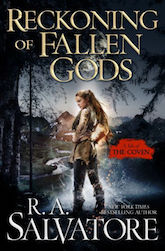 Salvatore continues to plumb new depths of the world of Corona, surprising even his oldest and most dedicated fans. The direct sequel to Child of a Mad God (and the 13th story set in the fictional universe) picks up where the first left off: Aoleyn, an Usgar girl who had come to reject her tribe’s brutality and misogyny, has saved the trader Talmadge and killed a god in the process, coming into her incredible power at a tremendous cost. Talmadge can’t seem to forget the fierce girl who saved his life, but neither have much time to ponder their existence: in the distant west, an empire that once dominated the world is waking up again, inspired by a total eclipse that is hearalded as a sign of their rebirth. The tides of history are turning, and Talmadge and Aoleyn seem destined to be swept up in them no matter what they do.
Salvatore continues to plumb new depths of the world of Corona, surprising even his oldest and most dedicated fans. The direct sequel to Child of a Mad God (and the 13th story set in the fictional universe) picks up where the first left off: Aoleyn, an Usgar girl who had come to reject her tribe’s brutality and misogyny, has saved the trader Talmadge and killed a god in the process, coming into her incredible power at a tremendous cost. Talmadge can’t seem to forget the fierce girl who saved his life, but neither have much time to ponder their existence: in the distant west, an empire that once dominated the world is waking up again, inspired by a total eclipse that is hearalded as a sign of their rebirth. The tides of history are turning, and Talmadge and Aoleyn seem destined to be swept up in them no matter what they do.
The Wolf in the Whale, by Jordanna Max Brodsky (January 29, Orbit—Paperback)
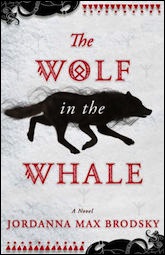 Omat is an Inuit, a powerful angakkuq, or shaman, who can speak with animals, and even take on their form. Omat is also a uiluaqtaq, one who identifies as neither a man or a woman. Their family is on the verge of extinction, however, after a disaster left the tribe without hunters, and after years without new children to replenish the population. Even Omat’s power cannot sustain them for long. So when another tribe comes across their isolated village, it is cause for celebration—but the new tribe will not accept Omat as they are and insist she live as a woman, causing conflict that erodes the tribe’s chances even further—just as Norsemen arrive, bringing a whole new level of threat. The author of the Olympus Bound trilogy starts anew with a propulsive, deeply researched glimpse into a time and place that will be familiar to few, and which proves to be as fascinating as any fictional universe.
Omat is an Inuit, a powerful angakkuq, or shaman, who can speak with animals, and even take on their form. Omat is also a uiluaqtaq, one who identifies as neither a man or a woman. Their family is on the verge of extinction, however, after a disaster left the tribe without hunters, and after years without new children to replenish the population. Even Omat’s power cannot sustain them for long. So when another tribe comes across their isolated village, it is cause for celebration—but the new tribe will not accept Omat as they are and insist she live as a woman, causing conflict that erodes the tribe’s chances even further—just as Norsemen arrive, bringing a whole new level of threat. The author of the Olympus Bound trilogy starts anew with a propulsive, deeply researched glimpse into a time and place that will be familiar to few, and which proves to be as fascinating as any fictional universe.
Vigilance, by Robert Jackson Bennett (January 29, Tor Books—Paperback)
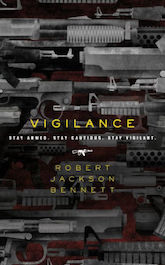 Robert Jackson Bennett pauses between installments of the Founders trilogy with a darkly satirical novella that pulls back from the gritty fantasy settings of his longer works for a story set in the near-future—2030, to be exact. In a time when military conflicts have become more and more like video games, with soldiers huddled around screens mashing buttons instead of pulling triggers, John McDean is a the hard-driving executive producer and mastermind behind Vigilance, a reality-TV game show in which active shooters are dropped into the midst of civilians, and anyone who manages to survive the ensuing chaos gets a rich payout. Although the show is highly popular, McDean struggles to find fresh ways of terrifying his audience—simple mall massacres are no longer drawing eyeballs—much to the disgust of bartender Delyna, who might be the only person not glued to the television when the show is on. It’s a fact that comes in handy when McDean discovers the truth about his own show—and finds himself on the wrong side of the camera for once. This pitch-black satire of our modern-day gun culture is almost too painfully true to be funny.
Robert Jackson Bennett pauses between installments of the Founders trilogy with a darkly satirical novella that pulls back from the gritty fantasy settings of his longer works for a story set in the near-future—2030, to be exact. In a time when military conflicts have become more and more like video games, with soldiers huddled around screens mashing buttons instead of pulling triggers, John McDean is a the hard-driving executive producer and mastermind behind Vigilance, a reality-TV game show in which active shooters are dropped into the midst of civilians, and anyone who manages to survive the ensuing chaos gets a rich payout. Although the show is highly popular, McDean struggles to find fresh ways of terrifying his audience—simple mall massacres are no longer drawing eyeballs—much to the disgust of bartender Delyna, who might be the only person not glued to the television when the show is on. It’s a fact that comes in handy when McDean discovers the truth about his own show—and finds himself on the wrong side of the camera for once. This pitch-black satire of our modern-day gun culture is almost too painfully true to be funny.
Doctor Who Meets Scratchman, by Tom Baker (February 12, Penguin—Paperback)
 Fans of Doctor Who know Tom Baker best as the iconic Fourth Doctor, lover of Jelly Babies and very cool winter scarves. But did they know he also imagined himself an author of the Doctor’s exploits? In the 1970s, Baker and Ian Marter, who played Harry Sullivan, worked up a treatment for a Doctor Who feature film—and at one point, it seemed like it might actually be made, with Vincent Price attached to star. But the script was lost in the shuffle, Baker regenerated into Peter Davison, and decades passed. Now, Baker has dusted off the idea and regenerated it into a novel, which sees The Doctor (along with Harry and Sarah Jane Smith) arriving at a remote Scottish island for a bit of a rest. Instead, they find the isolated village under attack by hideous scarecrows. The Doctor takes on the challenge of protecting the innocent, but it’s all an elaborate trap set by an otherworldly force known as the Scratchman—who might be the devil himself. For Who-vians, this is a glimpse into an alternate timeline where the Doctor became the next film franchise—or just another delightful Fourth Doctor romp.
Fans of Doctor Who know Tom Baker best as the iconic Fourth Doctor, lover of Jelly Babies and very cool winter scarves. But did they know he also imagined himself an author of the Doctor’s exploits? In the 1970s, Baker and Ian Marter, who played Harry Sullivan, worked up a treatment for a Doctor Who feature film—and at one point, it seemed like it might actually be made, with Vincent Price attached to star. But the script was lost in the shuffle, Baker regenerated into Peter Davison, and decades passed. Now, Baker has dusted off the idea and regenerated it into a novel, which sees The Doctor (along with Harry and Sarah Jane Smith) arriving at a remote Scottish island for a bit of a rest. Instead, they find the isolated village under attack by hideous scarecrows. The Doctor takes on the challenge of protecting the innocent, but it’s all an elaborate trap set by an otherworldly force known as the Scratchman—who might be the devil himself. For Who-vians, this is a glimpse into an alternate timeline where the Doctor became the next film franchise—or just another delightful Fourth Doctor romp.
This post was also published on the B&N Sci-Fi and Fantasy Blog.
See the best books from previous months here.










